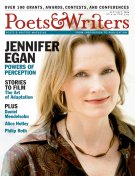As the number of poetry readings in communities across the country continues to grow, a format that was once relatively rare—the marathon—is becoming increasingly popular. Some, like the daylong reading of the collected poems of the late Stanley Kunitz, which took place on July 29 at the Fine Arts Work Center in Provincetown, Massachusetts, are held as memorials to honor individual poets, while others are held as fund-raisers for nonprofit literary organizations.
Still others are organized as celebrations of poetry in general. For example, on September 9, the open stage on Main Street in Canandaigua, New York, will be the site of a free all-afternoon poetry marathon. "[We] hope to encourage dialogue between writers and maybe catch the interest of people passing by," says organizer Marie Starr. The "continuous stream of poetry" will take place outdoors from noon until 6:30 P.M. and feature twenty-four local poets, each of whom will read from their own work for fifteen minutes. "Several [readers] are pretty established locally and nationally. Some have books out, and some are younger," Starr says. "We're going to try and make it an annual event."
The St. Mark's Poetry Project in New York City has held an annual fund-raising marathon on New Year's Day, from 2 P.M. to midnight (and sometimes later), for over thirty years. "It started as a way to hold a long reading that a lot of people could be involved with that would raise some money for the Poetry Project," says artistic director Anselm Berrigan. The price of admission, ranging from ten to sixteen dollars, goes directly to the organization's programming and helps fund its annual schedule of events.
Berrigan says the marathon format "appeals to the type of person who likes to get short blasts. The voice changes every few minutes, and there's nothing quite like that." Over a hundred readers participate in the event, which is attended by over a thousand people each year. Along with new and emerging poets, readers have included Allen Ginsberg, Anne Waldman, Charles Bernstein, William S. Burroughs, Kenneth Koch, Alice Notley, and Bernadette Mayer. The two-minute poetry readings are offset with performances by musicians, dancers, and performance groups. "We try and keep it focused on poetry to a large extent, but it's nice to break things up," says Berrigan.
Inspired by the St. Mark's event, the Woodland Pattern Book Center in Milwaukee launched an annual poetry marathon twelve years ago. "We were looking to have a fund-raiser that really related to our mission," says cofounder and executive director Anne Kingsbury. "We wanted it to be a chance for anyone who wrote to read their work for five minutes in front of a very supportive audience."
The nonprofit center, which houses an art gallery and bookstore, is the site of the roughly twelve-hour event, which features over a hundred readers and is held on the last Saturday in January. Admission costs anywhere from six to eight dollars, and readers are asked to find sponsorship of a minimum of twenty-five dollars. In addition, neighborhood businesses support the event by underwriting the marathon at a rate of three hundred dollars per hour.
The proceeds, which now total over ten thousand dollars annually, are used to offset the center's programming costs. Phone registration for readers begins in October, and the marathon is promoted through print, radio, and TV, as well as on the organization's Web site and in their newsletter. "It started out being local poets. Now we have people that come from Chicago and throughout the state," says Kingsbury, adding that the event attracts the "expected people who are published and teach at the university" but also "people who could be truck drivers or chiropractors or someone who teaches yoga. It cuts across boundaries."
On the West Coast, the Bay Area Poetry Marathon, which started in Boston in 2001 and moved west in 2004, has evolved into a series of three-hour mini-marathons, held one Saturday evening a month at the LAB, an arts organization in San Francisco, from May through August. Curators Joseph Lease, a poet and the chair of the creative writing program at California College of the Arts, and Donna de la Perrière, a member of the faculty at San Francisco State University and California College of the Arts, invite about thirty writers to read for fifteen minutes each. Though the majority of readers live on the West Coast, poets from New York City, Boston, New Orleans, Denver, and Taos participated in front of audiences of more than sixty people at the events this past summer. Over the years, readers have included poets Rae Armantrout, Lyn Hejinian, Michael Palmer, and Leslie Scalapino.
Laura Mullen, a poet who participated in one of the San Francisco marathons in 2005, says audience members aren't the only ones who benefit from the diversity of a marathon lineup. "I was very glad to be reading with names I had heard but whose work I didn't know so well," she says. An associate professor at Louisiana State University in Baton Rouge, Mullen describes marathons as "different worlds coming together."
For more information about these annual marathon readings, visit the sponsoring organizations' Web sites: www.poetryproject.com, www.woodlandpattern.org, and www.thelab.org.
Anna Mantzaris is a freelance journalist.








